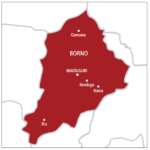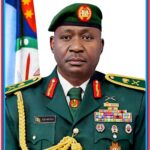Reports on Tuesday have said a violent encounter between the members of the two opposing sides of the insurgents based in Borno State has led to the death of the leader of the Jama’atu Ahlil Sunnah Lil Da’awatu Wal Jihad, Abubakar Shekau, as well as top commanders of the Islamic State’s West African Province (ISWAP).
The offensive according to a source privy to the procedures of the two terror groups lasted for days before Shekau was overpowered on Tuesday.
- APC tackles lawmakers for breaking strike to approve N100b loan for Gov Fintiri
- Buhari inducts 3 fighter aircraft into air force inventory
ISWAP broke away from the Shekau group following some misunderstandings and reportedly joined forces with an international terror network where it is believed to be getting support.
Several commanders left the Shekau-led group to the ISWAP which has its operational headquarters and bases in northern parts of Borno State.
The source said ISWAP which was behind the recent attacks in Damasak, Marte, Mainok, Dikwa and Maiduguri towns in Borno as well as the Geidam town in Yobe State, “does not target civilians in most of its attacks, rather, it was against constituted authorities including security forces. The group handpicks and kills people perceived as enemies such as members of a volunteer security group, CJTF.”
On the contrary, Shekau and his followers operate from the southern parts of the state, mostly Mandara Mountains, Sambisa National Park and the Alagarno forest.
The group had carried out several deadly attacks on its targets including civilians.
The source said Shekau was strict on his followers and does not tolerate rebellious behavior and that he had killed several of his renegade commanders.
Why ISWAP attacked Skekau
The military have launched several attacks on the ISWAP’s hideouts in the northern parts of the state and dislodged their members while air raids have continued unabated, according to the source.
“The military have sustained onslaught against the group which has its hideouts in the semi-arid landscape with sparse vegetation. Their enclaves are being decimated and with time they will have no hiding place,” he said.
The group allegedly resolved to dislodge Shekau with the intent of relocating to Sambisa and the mountainous areas to evade air attacks by the military jets.
“It was not difficult for the group to locate and launch attack on the Shekau-led base in Sambisa. There was fierce confrontation before Shekau succumbed and agreed to negotiate with ISWAP commanders. It was during the meeting that an explosion occurred and it was not clear whether or not Shekau was among those killed in the scene,” the source clarified.
He said it was likely that Shekau had survived the offensive and fled to another hideout which may be unknown.
“He had survived several attacks in which he was proclaimed dead,” the source added.
He said some of the followers of Shekau who were forced to flee the violent confrontation have sought refuge in different locations in the forest and are ready to pay “deep” allegiance to anybody declared as leader of the insurgents.
Bonus for security forces
Following the encounter between the two terror factions and the alleged death of their commanders and possibly leaders, the source said a fertile ground which may be the sine qua non for defeat of the insurgents is created.
“This is an added advantage to the security forces particularly the military to quickly close in on the two terror groups before they regrouped and become unconquerable again,” the source explained.

 Join Daily Trust WhatsApp Community For Quick Access To News and Happenings Around You.
Join Daily Trust WhatsApp Community For Quick Access To News and Happenings Around You.


